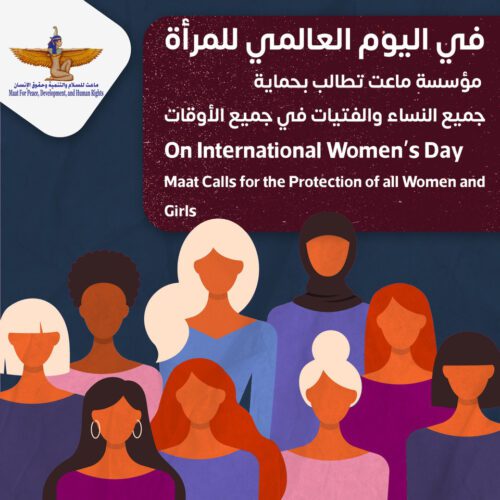On International Women's Day,Maat Calls for the Protection of all Women and Girls
Okeil: Women are the most vulnerable to climate changes
International Women's Day (IWD) is celebrated every year on March 8. Women are still striving to achieve their rights to equality, non-discrimination, non-violence, and human dignity. This day draws the world's attention to the issue of women, in which we celebrate the social, economic, cultural, and political achievements of women. The United Nation's theme for this year's observance is “Gender equality today for a sustainable tomorrow”, as promoting gender equality in light of the climate crisis and disaster risk reduction is a global challenge we face in the twenty-first century.
Maat for Peace, Development and Human Rights asserts that women are the most vulnerable to the effects of climate change because they represent the majority of the world's poor population and are most dependent on natural resources threatened by climate change. Therefore, examining the opportunities -- and the barriers as well -- for empowering women and girls to participate in decision-making on climate change and sustainability leads to sustainable development and gender equality. We cannot have a sustainable or equal future without achieving gender equality.
As to the Women, Peace, and Security (“WPS”) agenda, Maat highlights the UN Security Council Resolution 1325, which recognized the effects of wars and internal armed conflicts on women and their role in building peace. It was reinforced by later resolutions, including Resolution 1820, which recognized that sexual violence in conflict situations is a security issue that requires a security response, in addition to the remaining resolutions of 1888, 1889, 1960, and 2250. Maat also marks the inability of the Middle East and North African countries to fulfill the commitments of the peace and security agenda for women through the formulation of national plans for the resolution.
Women are the most affected by wars and armed conflicts among other groups. Women in the Arab region face countless obstacles whether in conflict or peaceful times. Despite efforts and decisions adopted by Arab governments to empower and protect women through strengthening the legislative structure, ensuring its implementation, taking executive decisions that put women on an equal footing with men in parliaments, and allocating specific ministerial quotas for women in some Arab governments, thus reinforcing humanitarian security that brings together all groups of society, which leads to building a sustainable community that enhances the achievement of SDG 16. However, women in the Arab region still face many structural obstacles that delay its incorporation in decision-making as they are equal to men and are not incompetent.
To name a few of these obstacles, the stereotypical image that international treaties such as the Convention on the Elimination of All Forms of Discrimination against Women violate religious norms and traditions, armed conflicts rampant in some Arab countries, which marginalize women and make them a target for many violent practices that are even reinforced by impunity and lack of accountability for crimes, such as sexual violence, physical assault, and gender-based violence. The goal of women is to avoid harm, stigmatization, and defamation rather than to obtain their legitimate rights, which puts them in a permanent defensive position.
Even in the international community, women are not considered a partner in preventing conflict, and in concluding peace negotiations and other armistice and ceasefire agreements. Aymen Okeil, the international human rights expert and president of Maat, said that in recent years, Arab women received a great deal of participation in the governments of Arab countries, which is a positive step. In both the UAE and Mauritania, women hold nine ministerial portfolios, and in Egypt, women have eight ministerial portfolios, which is the highest percentage in the history of Egypt. However, women do not participate in the cabinet formation in both Saudi Arabia and Yemen. Arab women also hold many parliament seats. In the UAE, women have 50% of the seats in the legislative authority. In Iraq, women represent 29.4% of parliament members, and in Egypt, women make up 27.4% of parliament seats.
Okeil added that statistics and data still indicate that women are the most vulnerable to violence, discrimination, and inequality, despite all the achievements they have witnessed. They are also more vulnerable to the effects of climate change than men, the world's poor majority, more dependent on natural resources threatened by climate change. Women have less share of development and participation in public life. They are the most affected by wars and armed conflicts. Their political, civil, economic, social, and cultural rights are the most violated, which foretells the impossibility of women fulfilling their human rights.
Maat commends the efforts and initiatives of the United Nations and the European Union that focus on eliminating all forms of violence against women and girls, achieving gender equality, empowering women by the sustainable development goals, establishing the value of women, and recognizing their human rights. However, the recent period has witnessed a lack of funding for women's organizations or programs aimed at women's empowerment or gender equality. Donors' priorities have changed, especially after the Coronavirus pandemic, which has affected women's empowerment in the Arab region. Maat affirms its commitment to women's issues and the promotion of their human rights. We thank all the women of the world who work and strive for their families and society.
shortlink: https://maatpeace.org/en/?p=34681












